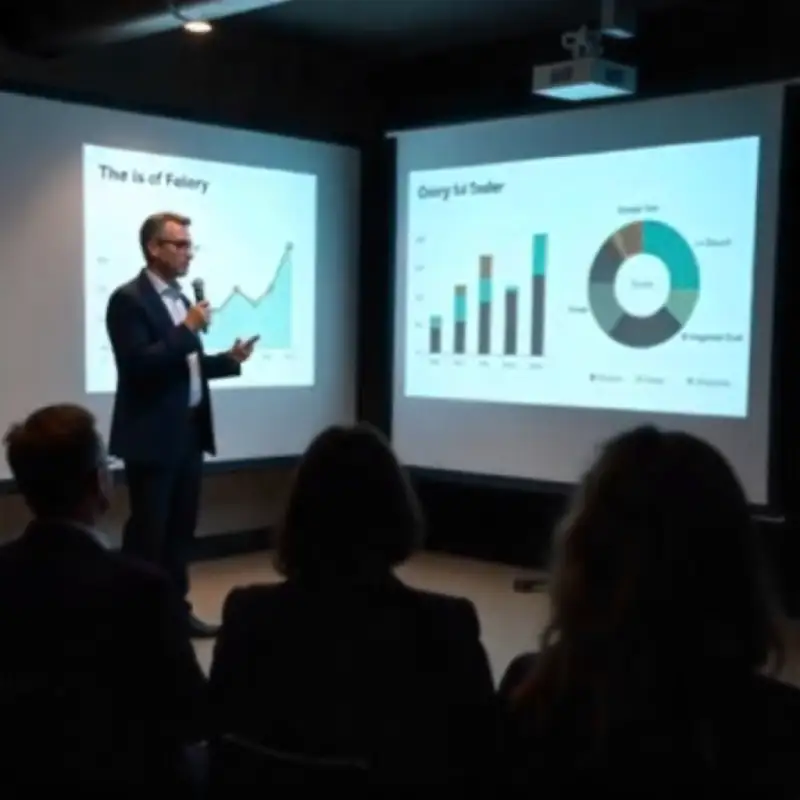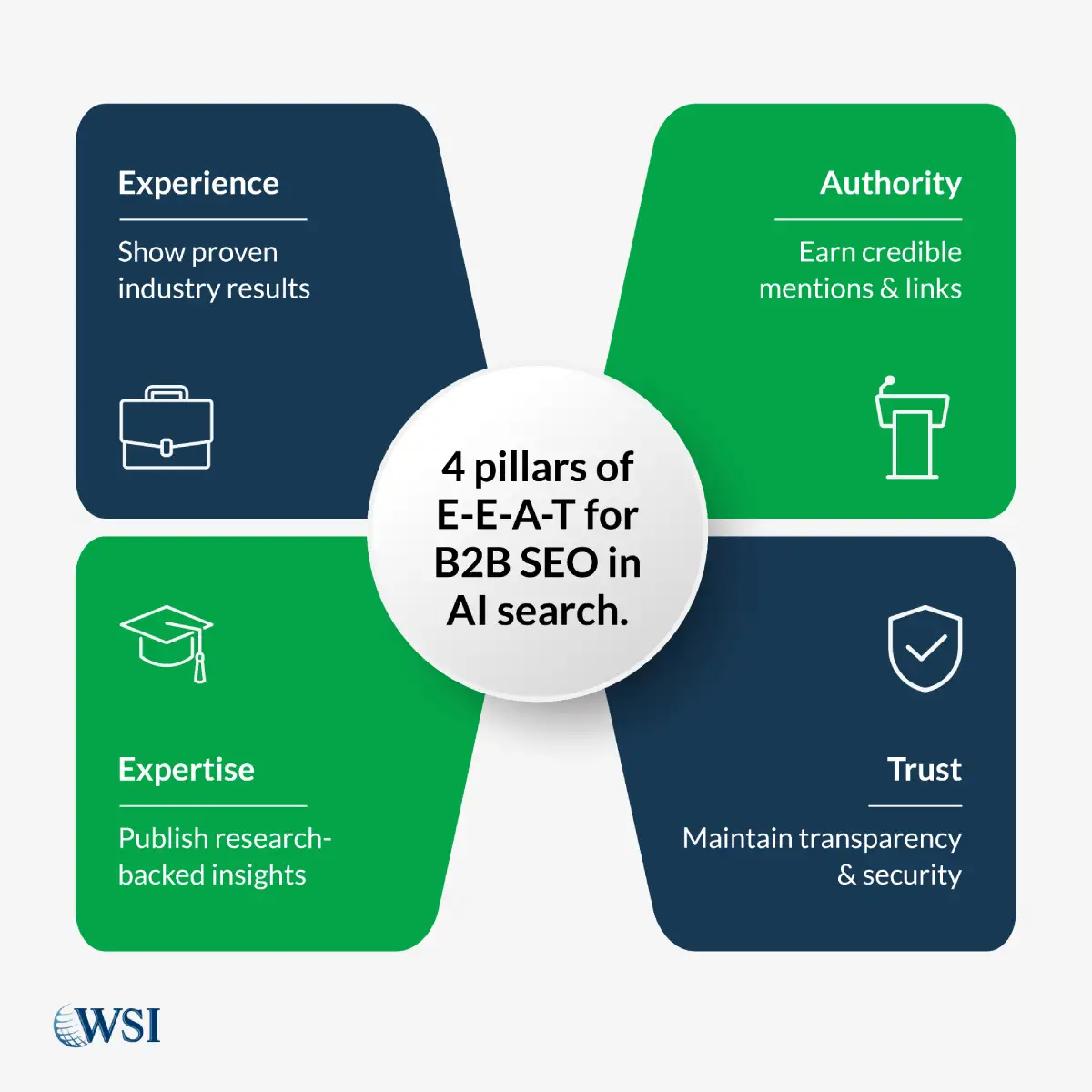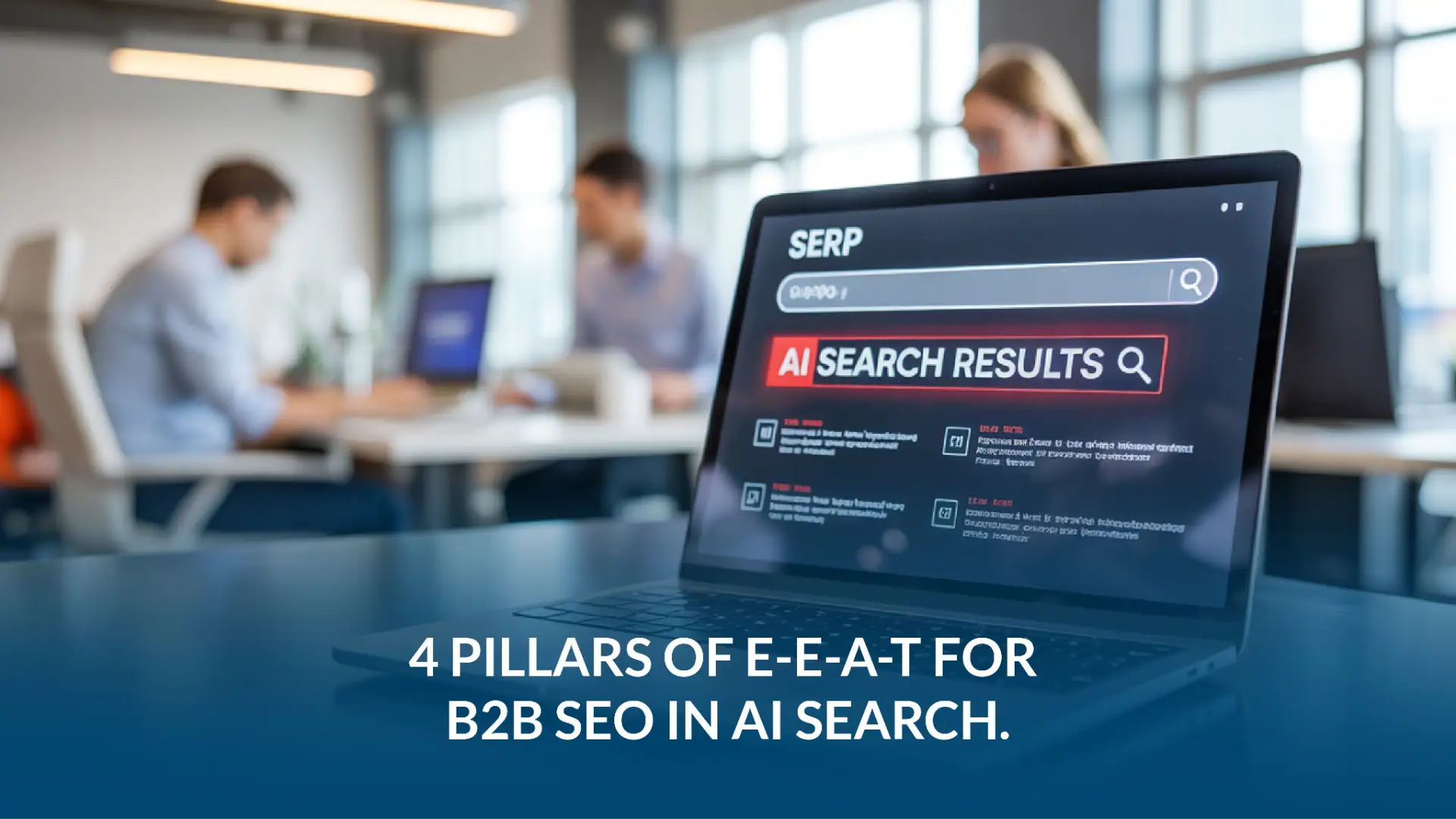The search world is moving fast, and B2B marketing teams are feeling the shift. Google’s AI-powered search isn’t just listing websites anymore; it’s deciding which businesses deserve to be part of the conversation. That decision often comes down to one framework: E-E-A-T.
For B2B companies, mastering E-E-A-T is more than a ranking factor. It’s a way to prove your credibility to both search engines and real buyers, making high-stakes decisions. Let’s break down what it means, why it matters, and how you can strengthen every pillar to keep your business visible in the AI-driven search era.
Key Takeaways:
- Strengthening E-E-A-T, Experience, Expertise, Authority, and Trust, is now critical for B2B companies to appear in Google’s AI-powered search results.
- Consistent trust signals, authoritative content, and real-world proof of expertise increase the chances of winning featured snippets, voice search answers, and AI-generated recommendation lists.
- A deliberate, ongoing strategy that audits your digital presence, updates content regularly, and maintains brand consistency across platforms is essential for long-term search visibility.
Contents
- 1 What E-E-A-T Means in B2B Marketing
- 2 Why E-E-A-T Matters in Google’s AI Search
- 3 Building Experience for B2B Trust
- 4 Demonstrating Expertise in B2B Content
- 5 Establishing Authoritativeness in Your Niche
- 6 Enhancing Trustworthiness for Google and Buyers
- 7 How E-E-A-T Impacts AI-Powered Search
- 8 Practical Tips for Improving Your B2B E-E-A-T Score
- 9 Common Pitfalls to Avoid
What E-E-A-T Means in B2B Marketing
E-E-A-T stands for Experience, Expertise, Authoritativeness, and Trustworthiness.
While the concept began in Google’s Search Quality Evaluator Guidelines, it has now become part of the AI-driven algorithms shaping what shows up in AI Overviews, voice search responses, and featured snippets.
In a B2B context, these signals are even more critical because:
- Purchase decisions often involve significant budgets and multiple stakeholders.
- Buyers demand proof that your company understands their industry at a high level.
- Trust can be lost instantly if your digital presence feels inconsistent or unverified.
E-E-A-T isn’t a checklist, it’s a long-term credibility strategy. Companies that invest in it are rewarded with better visibility, stronger buyer confidence, and higher lead-to-close ratios.
Why E-E-A-T Matters in Google’s AI Search
Google’s AI is trained to filter out anything that looks uncertain, outdated, or unverified. Instead of showing hundreds of options, AI tools now pull the best answers and providers it can find, often just a handful.
For your business, this means:
- If your authority signals are weak, you’re less likely to be recommended.
- AI looks for consistency in your brand across websites, profiles, and citations.
- Outdated, generic content will be passed over for recent, high-quality, expert-led resources.
The stakes are higher because these AI-generated results often appear above traditional search listings. If your competitors are building stronger E-E-A-T profiles, they could become the default choice in your industry.

Don’t let competitors dominate AI-driven search results.
- We’ll help you identify E-E-A-T gaps that are costing you visibility.
- Get a B2B-focused SEO strategy designed for the AI search era.
Building Experience for B2B Trust
Experience is about proving you’ve done the work and solved the problems that matter to your audience. AI systems don’t just read your claims; they look for supporting evidence across the web.
That means your website, LinkedIn, and industry publications should consistently show:
- Documented success stories, Case studies that detail client challenges, your approach, and measurable results are gold for both AI and human readers.
- Operational proof, show behind-the-scenes processes, technology in action, or on-site expertise through images, videos, or interactive demos.
- Public speaking and event participation, Recordings from webinars, conferences, or panel discussions build digital “experience” footprints.
In B2B, “experience” also extends to niche knowledge. If you specialize in a vertical market, such as manufacturing, SaaS, or energy, your examples should reflect that expertise in context.
Demonstrating Expertise in B2B Content
Expertise goes deeper than general industry knowledge. Google’s AI weighs even if your content reflects the latest trends, standards, and methodologies. It also considers who is behind the information.
Ways to demonstrate expertise effectively:
- Author bios with credibility, Include qualifications, certifications, and years of experience. Link to professional profiles where possible.
- Content depth, Go beyond surface-level commentary. Use original data, charts, and analysis that competitors haven’t published.
- Timely updates, Refresh your top-performing content when regulations change, technology evolves, or new best practices emerge.
Buyers are more likely to choose a vendor whose thought leadership shows mastery of the subject. And AI tools are more likely to feature that vendor in short-listed recommendations.

Turn your expertise into a powerful lead magnet.
- We’ll design a content plan that showcases your authority to both buyers and Google’s AI.
- Stand out with resources your competitors can’t match.
Establishing Authoritativeness in Your Niche
Authority is built when other credible voices in your industry validate your expertise. Google’s AI measures this through backlinks, mentions in respected publications, and overall brand presence.
How to strengthen authority:
- Earn high-quality backlinks, Focus on links from reputable industry sites, not just generic directories.
- Collaborate with recognized experts, Co-author articles, host joint webinars, or publish interviews.
- Maintain active professional channels, A consistent, well-managed LinkedIn presence, participation in industry forums, and visible contributions to trade groups all reinforce authority.
When industry peers acknowledge your value, it sends a strong trust signal to AI search, increasing the odds of being featured in top-tier recommendations.
Enhancing Trustworthiness for Google and Buyers
Trustworthiness is the factor that can make or break a B2B deal. Even the most authoritative content won’t convert if buyers question the legitimacy of your business.
To strengthen trust signals:
- Website transparency, Display physical office locations, clear contact details, and team introductions.
- Security protocols, Ensure your site runs on HTTPS and includes visible privacy and compliance statements.
- Authentic reviews, Use third-party review platforms where feedback can be verified, and respond to reviews professionally.
For AI search, trust signals also reduce the risk of misinformation, which is a top priority for Google’s algorithms.

How E-E-A-T Impacts AI-Powered Search
In AI-powered search environments, the difference between ranking and disappearing is even when your business is verifiably credible.
Featured Snippets
Google’s AI often uses featured snippets as its source material for AI Overviews. These high-visibility spots are typically pulled from pages that demonstrate strong E-E-A-T. The content must be up to date, factually accurate, and written by someone with recognized expertise. In B2B, this could mean a snippet showing your process for solving a complex industry problem or summarizing research you’ve published. The more structured your content is, with clear headings, bullet points, and concise answers, he more likely it is to be chosen.
Voice Search Answers
When users ask voice assistants for information, AI prioritizes responses that are short, direct, and easy to verify. This means your pages should contain clear, conversational answers to common industry questions, backed by authoritative references. For example, a manufacturing supplier could win voice search visibility by providing a one-sentence definition of a technical term, followed by a deeper explanation on the same page. The clarity and credibility of that content boost both user trust and AI preference.
Recommendation Lists
AI-generated “best of” or “top provider” lists depend heavily on trust signals. Businesses that appear in these lists often have consistent brand information, a strong presence in reputable directories, verified client reviews, and recognition from industry publications. For B2B companies, maintaining a robust and aligned presence across all platforms, from your website to LinkedIn and industry-specific portals, increases your chances of being included in these AI-curated shortlists.
By aligning with Google’s Search Quality Guidelines, you position your company as the “safe choice” for both algorithms and human decision-makers.
Practical Tips for Improving Your B2B E-E-A-T Score
Improving E-E-A-T isn’t about one-off fixes. It requires a consistent, structured approach that gradually builds your brand’s credibility in the eyes of both search engines and buyers. Here’s how to make it part of your long-term strategy:
1. Audit Your Current Digital Presence
Start by assessing every point where your brand is visible online, your website, LinkedIn page, industry directories, and even team member profiles. Look for gaps such as missing author bios, outdated articles, or content without clear sourcing. An E-E-A-T audit should also check:
- Find out if your content includes verifiable data and cites credible sources.
- If your contact information is easy to find and matches across all channels.
- Security indicators, such as HTTPS and compliance statements.
A comprehensive audit not only shows you what’s missing but also gives you a benchmark to measure progress against.
2. Build a Trust-Focused Content Calendar
Most content calendars prioritize keywords and posting frequency. In an AI-driven search environment, you also need to plan content that strengthens trust. That means mapping out a schedule for:
- Case studies that showcase measurable results.
- Thought leadership articles written by named, qualified authors.
- Video explainers and behind-the-scenes features showing your team in action.
- Industry updates that position your brand as an informed, reliable source.
By designing a calendar around trust and authority, you ensure that every piece of content adds weight to your E-E-A-T profile.
3. Track Search Performance Trends
E-E-A-T signals evolve with Google’s updates, especially as AI tools become more selective. Use analytics platforms to track rankings, featured snippet appearances, and engagement rates for your top pages. If visibility dips after an update, investigate if there’s outdated content, missing authorship, or reduced backlink activity that might be the cause. The companies that thrive are the ones that adapt their approach as the search environment changes.
The more deliberate you are with these steps, the more likely AI will classify your business as a credible, trustworthy source worth placing in top search positions.
Common Pitfalls to Avoid
Even well-resourced B2B marketing teams can weaken their E-E-A-T without realizing it. Avoiding these mistakes will help preserve the credibility you’ve worked hard to build:
Publishing Generic, Unverified Content
Search engines and buyers both value specificity. Content that reads like a broad overview without first-hand insights, real data, or clear sourcing risks is dismissed as low-value. Instead, include expert commentary, client examples, and verified statistics to back up every claim.
Letting Brand Voice Disappear Into Overly Automated Messaging
Automation can streamline content production, but over-reliance on templated copy removes the human element. Readers can tell when a piece lacks personality or real experience. Keep your tone consistent, incorporate authentic perspectives, and ensure automation supports, rather than replaces, genuine communication.
Having Inconsistent Company Information Across Channels
If your business address, leadership names, or even brand messaging differ between your website, LinkedIn, and third-party profiles, it raises credibility concerns. Search engines look for alignment across all mentions of your business. Regularly audit and update every profile to maintain a unified, authoritative presence.
A strong E-E-A-T profile isn’t just about adding new content, it’s about ensuring every part of your brand’s digital footprint reinforces the same message: that you’re experienced, knowledgeable, recognized, and trustworthy.
Preparing for the Future of AI Search
E-E-A-T isn’t a one-time SEO project. It’s an ongoing commitment to producing trustworthy, expert-led content and maintaining a strong professional presence. In the coming years, AI-driven search will only become more selective. Companies that invest in credibility now will own the most valuable digital real estate tomorrow.

Ready to be the brand Google’s AI chooses first?
- We’ll strengthen your E-E-A-T foundation so you lead in AI-powered search results.
- Outrank competitors, attract qualified buyers, and win more deals.


